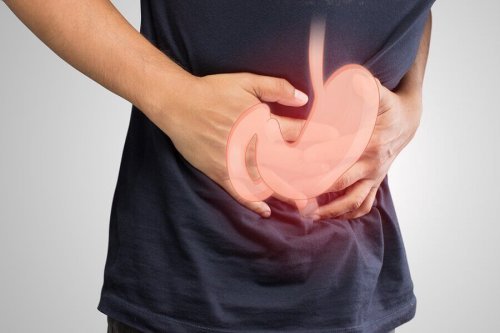Functional Dyspepsia: Causes, Symptoms & Remedies

Functional dyspepsia is a disease that’s practically caused by stress or anxiety that can affect the stomach and inflame the gastric mucosa. It’s characterized by being a very common emotional disorder that affects many people and produces symptoms such as heartburn, nausea, heartburn, or stomach pain.
Functional dyspepsia can be acute or chronic. Acute gastritis appears abruptly and is intense. However, chronicle gastritis can last for years if not treated. A less common form of the disease is erosive gastritis, which generally doesn’t cause a lot of inflammation, but can cause bleeding and ulcers in the lining of the stomach.
The inflammation can be caused by many factors, such as infection, stress, injuries or immune system disorders. Several studies have confirmed that emotional stress and depression may influence the development of gastrointestinal disorders such as functional dyspepsia. Fortunately, the symptoms of this disease can be treated at home with some natural remedies.
What Are the Causes of Functional Dyspepsia?

Functional dyspepsia can be caused by any of the following factors:
- Stress
- Anxiety
- Excess of alcohol
- Infections caused by allergies or viruses
- Bile reflux
- Poor diet
However, in addition to these factors, functional dyspepsia mainly appears due to a bacterium called Helicobacter pylori, which increases by the symptoms mentioned above. Also, getting overwhelmed with your daily routine along with family responsibilities can make this condition even worse.
This bacterium inhabits between 60 and 80% of people’s stomachs. It’s usually asymptomatic but it can damage the protective gastric mucosal barrier. Continue reading to find out more.
Read this article too: 5 Yoga Poses that Reduce Anxiety and Stress Levels
What are the Symptoms of Functional Dyspepsia?
The symptoms of functional dyspepsia may vary between individuals. Among the most common are:
- Vomiting
- Black stools
- A burning sensation in the stomach
- Loss of appetite
- Abdominal Pain
- Indigestion
- Nausea
- Upset stomach
- Heartburn
Treatment for Functional Dyspepsia
To treat this disease, you must follow a lite and healthy diet to help regulate the symptoms. This means that you should include vegetables, fruit, meat, fish, soup, rice and lots of water, among others in your meals.
At the same time, being emotionally stable is essential for treating gastritis. The fact of maintaining a mental balance helps the body to compose itself and thus allows the body and mind to be in harmony and function healthily.
Therefore, you must learn, among other things, to manage stress because it can responsible for increasing the production of gastric acid and impairs the stomach’s mucous membrane. On the contrary, exercising is the best solution to eliminate stress and stimulate the production of endorphins.
Plus, we recommend limiting your consumption of analgesics. If you suffer from episodes of functional dyspepsia and you purchase over-the-counter drugs, these may provide temporary relief. However, you would be better off consulting immediately with a specialist because they can provide you with a prescription to effectively decrease the acid secretions and protect the mucous.
What Remedies Relieve Functional Dyspepsia?

At home, the most important thing you can do is control your diet and relieve stress. Keep in mind that food plays a key role in treating functional dyspepsia. Not only does food prevent upset stomachs on a short-term basis, but it will also protect the digestive system on a long-term basis. Avoid drinking alcohol, eating processed foods, acids, dairy products, and sugary or spicy food.
Check out this article, too: Top 15 Healthiest Probiotics and Prebiotics
We recommend including foods that have probiotics because they can help improve digestion and stimulate regular movements. These supplements put good bacteria in the digestive tract, which can help stop the spread of the Helicobacter pylori bacteria.
Also, just as research shows, drinking green tea with honey at least once a week helps to significantly reduce the prevalence of H. pylori in the digestive tract.
- You can also try a spoonful of baking soda (9 g) because it can help put an end to heartburn that’s caused by functional dyspepsia.
- Also, aloe vera is one of the plants used to relieve burns, and also contributes to minimizing the consequences of functional dyspepsia.
- Essential oils, such as peppermint or ginger, may have a positive affect in the stomach.
Finally, don’t forget that stress can cause and worsen functional dyspepsia. Therefore, it’s very important to consider lifestyle changes that can help reduce anxiety levels. Most likely, if you begin to exercise, eating a healthy diet and sleeping well, you will feel much better.
All cited sources were thoroughly reviewed by our team to ensure their quality, reliability, currency, and validity. The bibliography of this article was considered reliable and of academic or scientific accuracy.
1. Angós R. Gastritis. Med. 2016;
2. Rugge M, Pennelli G, Pilozzi E, Fassan M, Ingravallo G, Russo VM, et al. Gastritis: The histology report. Dig Liver Dis. 2011;
3. Sipponen P, Maaroos HI. Chronic gastritis. Scand J Gastroenterol. 2015;
4. Soriano Izquierdo A, Sans Cuffí M, Elizalde Frez JI, Bessa Caserras X. Gastritis y gastropatías. Med – Programa Form Médica Contin Acreditado. 2000;
5. Lane EP, Miller S, Lobetti R, Caldwell P, Bertschinger HJ, Burroughs R, et al. Effect of diet on the incidence of and mortality owing to gastritis and renal disease in captive cheetahs (Acinonyx jubatus) in South Africa. Zoo Biol. 2012;
6. Lobetti R, Picard J, Kriek N, Rogers P. Prevalence of helicobacteriosis and gastritis in semicaptive cheetahs (Acinonyx jubatus). J Zoo Wildl Med. 1999;
7. Valdivia M. Gastritis y gastropatías. Rev Gastroenterol Perú. 2011;
8. Fox JG, Correa P, Taylor NS, Lee A, Otto G, Murphy JC, et al. Helicobacter mustelae-associated gastritis in ferrets. An animal model of Helicobacter pylori gastritis in humans. Gastroenterology. 1990;
9. Fox JG, Otto G, Taylor NS, Rosenblad W, Murphy JC. Helicobacter mustelae-induced gastritis and elevated gastric pH in the ferret (Mustela putorius furo). Infect Immun. 1991;
This text is provided for informational purposes only and does not replace consultation with a professional. If in doubt, consult your specialist.








